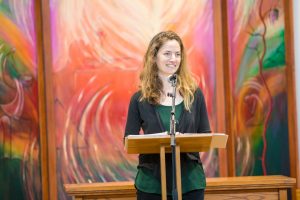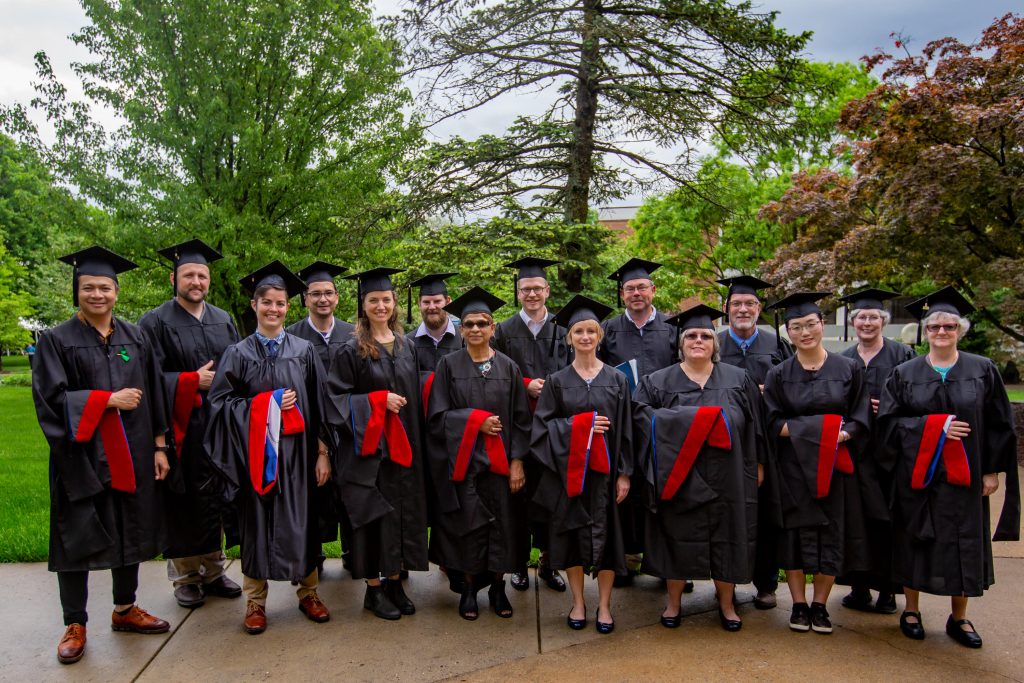Twenty-three Eastern Mennonite Seminary students celebrated their graduation during the 101st Commencement on Sunday, May 5. They come from five states and Honduras, Indonesia and Tanzania.
As part of final academic preparations this spring, seven students in the Master of Divinity or Master of Arts in Christian Leadership degree programs have presented capstone projects that touch on both the personal formation experienced within their seminary journeys, and the transformation they hope to bring about as leaders in ministry.
The capstone requirement helps seminarians synthesize and integrate into their unique ministry setting the seminary’s four guiding curricular principles of wise interpretation, mature practice, discerning communication and transformational leadership.
More capstone integration projects: 2015 2016 2017 2018

Master of Divinity capstones
- Karen Burke: Ministering to Jesus Behind and Beyond Bars
Burke writes: Mass incarceration is a national, community and family problem and I believe that as Christians we are called to help both prisoners and their families before, during and after incarceration. I believe everyone is made in God’s image and that when we look in the eyes of a man or woman behind bars, we’re seeing Jesus. We realize that they are people who have made mistakes, but who are loved by God as much as you and I are. There are over 37,000 people in Virginia State Prisons There are many obstacles that make it difficult, if not impossible, to re-enter society as a productive member. My capstone addresses some of the obstacles men and women face as they re-enter society and various resources available to help them. It also encourages those in faith communities to become involved with a list of ideas and resources.
- D.J. Mitchell: Challenging Despair: A Framework for Discipleship for People in Recovery
This project sees addiction as filling an underlying need for purpose and meaning in the face of rising despair in a society focused on material wellbeing. Therefore, any solution must be as encompassing as that which it replaces. Using a survey of congregational attitudes and resources, as well as anecdotal experience, it shows that congregations are not well-equipped to provide what is needed for recovery and healing. Using theoretical, theological, and practical sources, it develops a framework for discipleship oriented toward people recovering from addiction, trauma, abuse, and some types of mental illness. It anticipates that deliverance will be part of the healing process for many participants, and envisions elements of structure, including healing, liturgical theology, and accountability for small groups that would function as a sub-group of a congregation.
- Anna Efaw: Grounded Theology: Being Called to Ministry in/out of Rural Appalachia– Myths and Mission
Anna, a native of Appalachia, is a licensed local pastor in the United Methodist Church at the Aurora Charge in Aurora, West Virginia. Her project’s aim is to shed light on issues and challenges distinctive to rural Appalachia, to share what she learned about the Appalachian culture (although Appalachian born and raised, there was still a lot she felt she needed to learn), and to formulate a way to share this information with others called into ministry in rural Appalachia.
Her project was to draw attention to what makes ministry in rural West Virginia both challenging and a blessing. There are large cities like Charleston, Wheeling and Martinsburg that offer all the amenities of big city living. There are many more communities though that lack safe drinking water, electricity, internet and cell phone service. There are people who have never been out of their “neck of the woods” and have no desire to leave. Then there are those who have left and made a name for themselves only to be envied and begrudged for their success.
She writes: “There is a sacred bundle we all carry with us—our individual sacred bundle, the bundle of the church, and/or the community. It holds the secrets that we dare not tell another, the stories of loss and hope, hurt and restoration, sin and forgiveness. The task of building relationships and unraveling the sacred bundle to get to the heart of what the community and the people need is a hard task indeed. This task is made more difficult by the fact that I am an itinerant minister.”
- Larry Friedland: Dramatically Engaging the Scriptures
An exploration of how dramatic elements of the theater move and shape how scriptural texts are viewed and how those elements are and may be utilized in ministry.
- Tyler Goss: Church Afresh
This project sought to re-imagine the Anabaptist church afresh. Goss worked over 18 months to organize the Anabaptist Leadership Retreat, a March 2019 event that brought members of Mennonite Church USA and the Church of the Brethren together to connect, worship, and envision a vibrant, Christ-centered future for the two denominations. The retreat helped to inform what church afresh could look like. Lessons from the retreat were combined with knowledge gleaned from research to explore how Goss, a future church pastor, would want to re-imagine his own ministry.
- Christopher Ndege: TEE: A Model of Training Church Leaders in Global South
Christian churches in Africa are multiplying rapidly in recent decades.These multiplications create an enormous challenge for church leadership training institutions in Africa.The big challenge is how to equip or train leaders who are already engaged in serving the Church, but don’t have theological training. Further theological training or education will guide them in and through the changes occurring in religion and society in Africa. This capstone addresses the need by offering a framework for a specific model of training that can be appropriated for educating men and women for ministry as church leaders.
- Valerie Showalter: Grounded Theology: Merging Perspectives of Anabaptist Women and Ecology
This project begins to construct a more robust and informed Anabaptist theology of creation care by purposefully integrating the voices of Mennonite women who name, as part of their vocation, a connection to the earth. An Anabaptist creation care theology will embrace the many voices from the margins who offer a holistic, Christ-infused vision for the restoration of humanity and the earth, seeking to counter the narrative and attitudes of patriarchal domination and destruction. By integrating Anabaptist women farmers’ experiences and spirituality, a creation care theology will include an awareness of the web of mutuality between humans and all creation, spark practices of mindfulness, and will helpfully name our temptations to subjugate the land and other humans. The women remind us, too, that God’s vision for shalom is purposefully designed to restore humans and all creation to Godself, and humans are invited to participate in that vision.
Master of Arts in Christian Leadership Ministry Specialization Projects
- Suzy Kanode: “Discerning the Angel of the Summer Institute for Spiritual Formation”
Her project was to discern the hidden spirit, or core identity, of the seminary’s Summer Institute for Spiritual Formation, a two-week spiritual direction training program that provides training in individual spiritual direction and congregational spiritual formation. The program has been offered annually since 1996. She explored the program’s spiritual and intellectual niche and made recommendations for its continued sustainance.
- Ken Wettig: The Spirit, Formation, and the Heart of the Local Church
What are the marks of the church that will not only survive, but even find ways to thrive within our current post-modern, post-truth, post-christian culture? In my presentation, I will argue that the old toolbox of the evangelical church, seeking ever increasing relevance, and acculturation is no longer sufficient. Rather, the church must reclaim the kind of Spirit empowered, Christ centered, church located, counter formation process’, which marked the catechesis of the Early Christian church; as it thrived under the dominating shadow of the pagan Roman empire.
